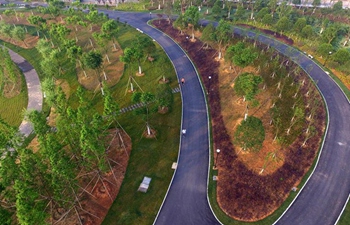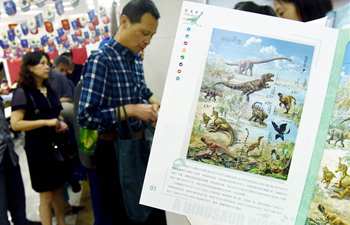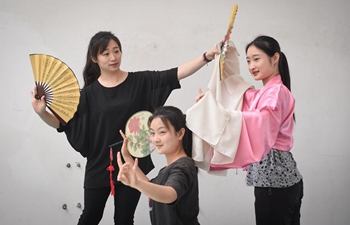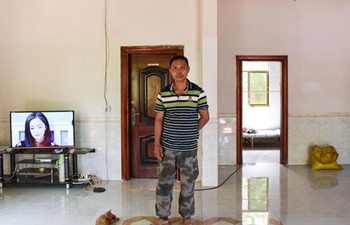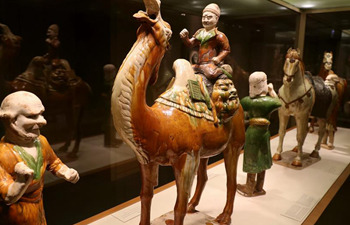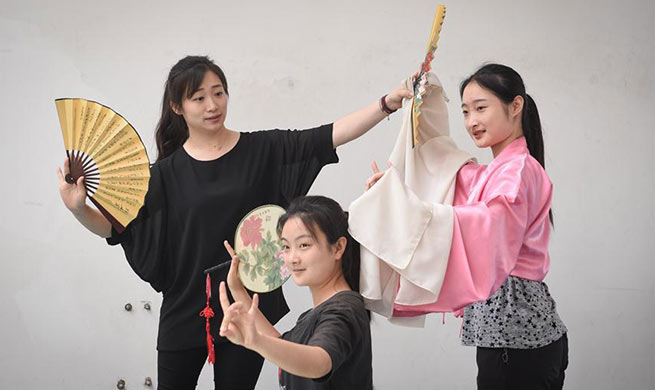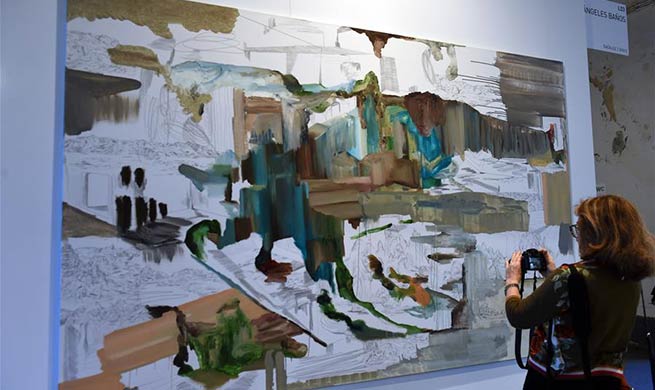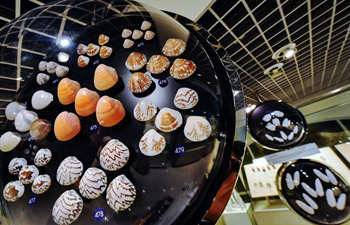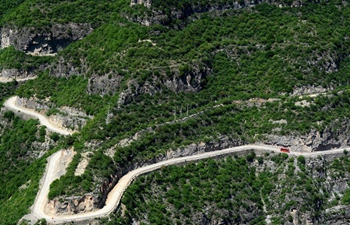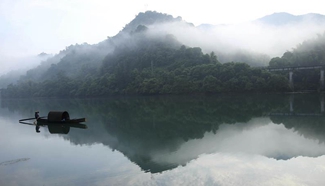By Tao Jun, Tieu Bao
HO CHI MINH CITY, May 19 (Xinhua) -- "Eating dragons makes you as strong as a dragon, especially during nocturnal activities," goes a Vietnamese saying.
Many Vietnamese men, never being shy about embracing supposed sexual tonics, often eat the reptile more popularly known as the Asian or Chinese water dragon (Physignathus cocincinus).
Drinking alcohol mixed with the blood of snakes, goats, tortoises and various species of birds is also popular in Vietnam. Though pungent, many like the taste.
Many local drinkers even believe that it will improve their health and give them a "certain stamina." As a result, species such as the water dragon now face a long-term threat to their existence.
"After drinking the blood and eating the organs and meat of this dragon, my wife will worship me tonight," said a man, laughing with his three friends in a restaurant in Hai Ba Trung Street, in Ho Chi Minh City.
A waiter brought a struggling reptile to the table, while nearby guests peered in interest at the thrashing water dragon. After sizing up the lizard, the man decided on a pair, one to be eaten raw with vegetables and the other to be roasted.
With head duly dispatched, the dead animal was drained of blood with the liquid trickling into a prepared glasses of rice wine. Then the heart, bowels, and gall-bladder were extracted and placed ceremoniously into a glass for the guests to admire.
After a short 15-minute hiatus, the four diners were presented with another bloody glass full of alcohol and two dishes comprised of the dead lizard.
Despite health warnings that such lizards are responsible for the circulation of infectious diseases through the eating of their blood sausages or drinking its blood, many restaurants in Ho Chi Minh City have caved into customer demand for the unlucky reptile.
Hai, a cook, said besides the peculiar taste and the hope of becoming "as strong as a dragon," the water dragon has risen in popularity due to the contrary belief that it is a safe food.
"The media has constantly been saying that wild animal meat is often mixed with formaldehyde (to keep it fresh for a long period of time) which is believed to cause cancer. Therefore, heavy drinkers are avoiding it. However, the water dragon is slaughtered on the spot, and tastes great," he said.
According to Vietnam's Red Book, which lists endangered flora and fauna based on criteria produced by the International Union for the Conservation of Nature and Natural Resources, besides central highlands provinces, the water dragon can be found in the north.
The reptile often lives in the forest in caves or bushes and beside streams or waterfalls, and although found throughout the west and north of the country, the total numbers of the reptile are in decline.
The Vietnam Red Book lists the water dragon as a wild animal at potential risk of extinction. An additional threat to the species is caused by the popularity of eating pregnant females, as its eggs have proved a popular delicacy.
One diner exclaimed: "The egg of the dragon is greasy, sweet and strangely tasty. Even a king would crave it!"
Water dragon seller Khang said: "They are becoming scarcer and scarcer, while demand is rapidly increasing. In order to meet demand, a growing number of restaurants are paying high prices in advance to hunters to ensure that they have supplies."
"Small water dragons weighing less than 200 grams are not that popular with diners. Many say they are willing to pay millions of Vietnamese dong (hundreds of U.S. dollars) for a water dragon king weighing over half a kilogram, but there are precious few of them about. Customers want wild animals, not the farmed variety," he added.
Water dragons prefer eating insects, especially those that damage rice paddies, such as locusts. The declining numbers of the reptile have led to an increase in lost crops as the insects take their toll. However, rich men are more interested in exotic novelties than such mundane problems.
To cope with the situation, Vietnam is taking various measures to diminish both supply and demand for wildlife meat and other products, including quicker prosecution of smugglers and national action plans to conserve wild animals.
On May 10, more than one week after being arrested, a 47-year-old local man named Nguyen Mau Chien, allegedly the leader of a big smuggling ring involving rhino horns, elephant tusks and other wildlife products from Africa to Vietnam, was prosecuted. His rapid prosecution has shown the strong determination of relevant Vietnamese agencies in preventing and combating illegal trade in wildlife.
In late April, Chien and his accomplice were arrested when transporting some 36 kilograms of rhino horns, two frozen tiger cubs and some other wildlife products from Ho Chi Minh City to Hanoi by train. He confessed that the smuggled items had been moved from South Africa to Malaysia and then to Ho Chi Minh City.
In May, the Vietnamese government approved an action plan to conserve primates in the country, calling for stronger law enforcement to combat the hunts and illegal trade by 2025, and work towards reducing hunting by 70 percent, as well as building three rescue centers to save and release primates back into the wild.
The plan requires building an inter-sectoral cooperation mechanism and confiscating shotguns in residential areas where endangered primates in need of protection live.
Awareness campaigns will be launched to minimize the consumption of products originating from primates. Meanwhile, lectures on primate conservation will be added to school and tertiary curricula.
"In Vietnam, more and more people have become aware that exploitation and use of rare and valuable wild animals are not only cruel and illegal, but also run counter to humane values of civilized life," Nguyen Thi Phuong Dung, vice chairwoman of Education for Nature - Vietnam (ENV), Vietnam's first non-governmental organization focusing on nature conservation and environment protection, told Xinhua on Thursday.
According to Dung, the habit of using wildlife products, to some extent, exhibits backwardness and poor knowledge, and has been pushing wild animal species to the edge of extinction.
"Please say 'no' to wildlife products. This small action has great meaning in protecting wildlife and building up a civilized lifestyle," she stressed.




